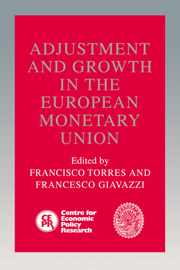Book contents
- Frontmatter
- Contents
- List of figures
- List of tables
- Preface
- List of contributors
- Foreword
- 1 Introduction
- 2 Economic and monetary union: critical notes on the Maastricht Treaty revisions
- Discussion
- 3 The design of optimal fiscal rules for Europe after 1992
- Discussion
- 4 Contracts, credibility and common knowledge: their influence on inflation convergence
- Discussion
- 5 Inflation in fixed exchange regimes: the recent Portuguese experience
- Discussion
- 6 Models of economic integration and localized growth
- Discussion
- 7 Shocking aspects of European monetary integration
- Discussion
- 8 Lessons of Massachusetts for EMU
- Discussion
- 9 Financial and currency integration in the European monetary system: the statistical record
- Discussion
- 10 Currency substitution: from the policy questions to the theory and back
- Discussion
- 11 Coordination of capital income taxes in the economic and monetary union: what needs to be done?
- Discussion
- Index
Discussion
Published online by Cambridge University Press: 29 January 2010
- Frontmatter
- Contents
- List of figures
- List of tables
- Preface
- List of contributors
- Foreword
- 1 Introduction
- 2 Economic and monetary union: critical notes on the Maastricht Treaty revisions
- Discussion
- 3 The design of optimal fiscal rules for Europe after 1992
- Discussion
- 4 Contracts, credibility and common knowledge: their influence on inflation convergence
- Discussion
- 5 Inflation in fixed exchange regimes: the recent Portuguese experience
- Discussion
- 6 Models of economic integration and localized growth
- Discussion
- 7 Shocking aspects of European monetary integration
- Discussion
- 8 Lessons of Massachusetts for EMU
- Discussion
- 9 Financial and currency integration in the European monetary system: the statistical record
- Discussion
- 10 Currency substitution: from the policy questions to the theory and back
- Discussion
- 11 Coordination of capital income taxes in the economic and monetary union: what needs to be done?
- Discussion
- Index
Summary
In this chapter, Canzoneri, Diba and Giovannini analyse the effects of goods markets and capital markets integration in the demand for money balances expressed in different currencies. It is a stylized analysis of competition between, and the survival of, different currencies. In a model of the type first developed by Baumol and Tobin, people hold money to purchase goods for consumption, from which utility is derived. In order to get the cash balances needed, people must travel to a firm (bank) and this costs them time that could be used for leisure: leisure can include the time spent shopping (the pleasure of choosing and buying goods) but not that spent going to the bank. Since leisure enters the utility function and is separable from consumption, this explicit substitutability enables the authors to derive endogenously an optimal number of times the representative agent goes to the bank to withdraw the amount of cash needed for his expenditures in consumption, which are known with complete certainty.
When there is more than one numeraire, the authors ask whether it is reasonable for all of them to co-exist simultaneously. The answer is no, for obvious reasons: markets are complete, there is a single representative agent who buys a single good (although there are two goods, these are perfect substitutes). In this set-up, it is said that the good money dominates the redundant currency that has bad properties. It is conjectured, because no formal proof is given, that a higher opportunity cost of holding money is, in general, associated with a lower demand for money.
- Type
- Chapter
- Information
- Adjustment and Growth in the European Monetary Union , pp. 338 - 339Publisher: Cambridge University PressPrint publication year: 1993



